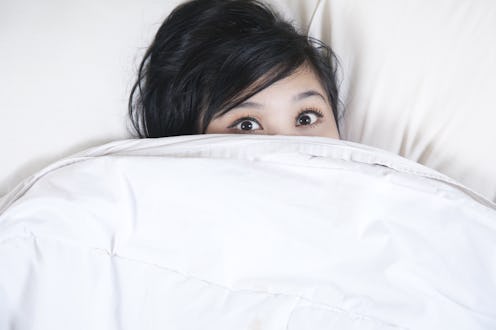Life
6 Sneaky Habits Keeping You Awake

In an ideal world, we'd all be clocking in eight hours of z's a night. We would cut down on afternoon naps and steer clear of caffeine to make falling and staying asleep a cinch. But even when we do stick to all the "right" sleeping strategies, it can be hard to doze off. If that's the case for you, your lifestyle choices might need a closer look, as there are some pretty unexpected things that can be throwing your precious slumber out of whack.
We checked in with Dr. Janet Kennedy, Ph.D., clinical psychologist and founder of NYC Sleep Doctor, who revealed six surprising habits keeping you from restful sleep. Spoiler alert: Your Candy Crush addiction may be one of them.
A Case of Sleep Performance Anxiety
Trying to fall asleep can actually be the thing keeping you from well, falling asleep. Kennedy calls it "sleep performance anxiety." Getting into bed to try to doze on command will increase anxiety if the body is not ready for sleep because you'll be too stressed out to relax and snooze, she says. Her favorite trick falling asleep is hopping into bed with a good ol' book. "Reading, especially fiction, occupies your mind, distracts you from stressful thoughts and allows your body to relax," she says. Never a better time to catch up on the Divergent series.
Working Out Too Close to Bedtime
So, research tells us that there is no ideal time to workout. Morning, afternoon, or evening, the best time to fit in a sweat session is more tied to personal preference than anything else. That being said, hitting the gym too close to bedtime can leave you counting sheep. "Exercise raises the body temperature and heart rate, so it can be hard to fall asleep [right after]. Some people don't have any trouble going to sleep after working out, but if snoozing post-workout is difficult, it's best to avoid vigorous exercise two to four hours before bed," says Kennedy.
Cuddling With Your Smartphone
What do email, Candy Crush, and Instagram have in common? They all could be sabotaging your sleep. "Your phone keeps the mind tied to work and stress. Easy access to devices also makes it too tempting to check all your apps, making it even harder to fall asleep," Kennedy says. Recent research has found that the light from smartphones increases sleep deprivation because it tricks our brains into thinking it's morning. An hour before bed, it's time to ditch your smartphone and tablet for the evening.
Too Little Unwinding Time
Trying to doze off immediately after a late night at the office or a night out raging might work sometimes, but it's not the best sleep strategy. And Kennedy notes that even if you do fall asleep quickly, the quality of your sleep may suffer. "You can’t work or play hard all day and expect to fall asleep and stay asleep without a wind-down period. The body and mind need a chance to transition from the active stress of the day to the relaxed state that leads to good sleep," she says. Set aside 30 minutes to an hour before bed to read, journal, or meditate — activities that will turn down the stress dial.
Irregular Sleep Schedule
Trying to "catch up on sleep" and snoozing until noon during the weekends can throw your sleep cycle out of whack. "It’s better to keep your wakeup time consistent even if you go to bed later than usual sometimes. That way, you’ll be tired when your normal bedtime rolls around the next night," Kennedy explains.
Skimping on Food
While downing a three-course meal or even a very fat-laden dish (think: hamburger, mac and cheese) pre-bedtime is discouraged, "diets that are too calorie restrictive can also interfere with sleep since blood sugar will be too low at night," notes Kennedy. Aim to eat a small snack an hour or two before hitting the hay, especially if you had an early dinner. Turkey on whole wheat or an apple with nut butter are great options.
Image: Fotolia/Creativa